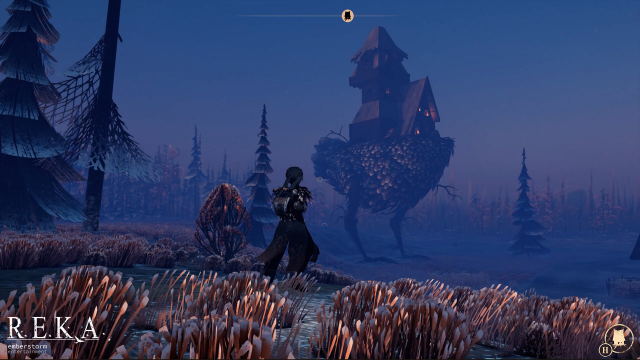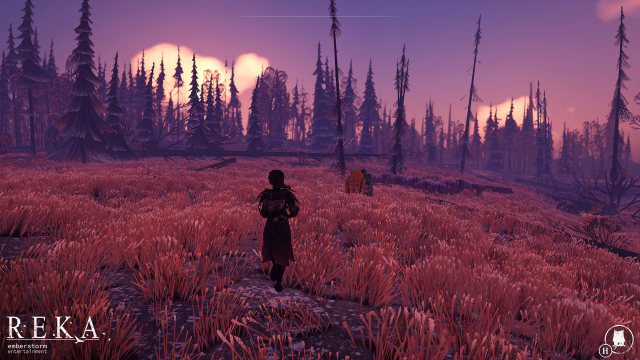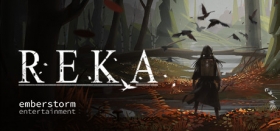
Developer Interview: Reka
Reka is a charming game heavily inspired by Slavic myth and the beauty of Europe, where you play a witch and help people, decorate your house, and brew potions. My wife showed me this incredible game many months ago, and thankfully the developers were nice enough to let me have a wonderful interview with them! Without further ado, here's what Emberstorm Entertainment has to say about their game.
Introduction. Tell me a bit about yourself!
Hey! We are Emberstorm Entertainment, a young, newly founded Game Development Studio based in Berlin. We are currently six people actively working on our studio's first project, Reka. Thanks for having us!
What inspired you to make a game about a witch that goes around helping others?
European folklore is well known through the fairy tales that have been told many times, but there is much more to be explored. Reka will primarily be based on Slavic myth, which hasn't had too much time in the spotlight yet. We want to take these stories and bring them closer to people who might have not heard of them yet; playing as a witch then is a natural fit. And we think a lot of people will like to live out their witch fantasy.
As for the helping, it is important to us to make a game free of combat that focuses on other parts of human interaction. Helping is definitely a big part of what you will do but not the only thing. Witches are often portrayed as only evil in pop culture, even though they are more morally ambiguous in a lot of stories. In Reka, we want to try to show both sides.
It feels like there's an undertone of sadness to the game. Was this on purpose?

Considering in-game the witch focuses a lot on herbs and brewing, did you have to learn much about the subject to apply it?
Oh, yes; a lot of research went into finding out about herbs and their various uses, be it cultural, mythological, or medicinal. Any collectable resource you find is either something that exists in reality or is referenced by something real. The way you, as the player, use them is also based on reality. When you use herbs to craft a remedy, that herb has medicinal attributes; when you use it to perform a ritual, there are cultural or mythological references for its capabilities.
A lot of the game focuses around customising the home. What can you tell us about the process that goes behind such gameplay mechanics?
There are many base-building games that do a great job of allowing you to build something very cool, so we needed to think very hard about what new things we could bring to the table that players would enjoy. We thought that building a witch's cottage on chicken legs would be fantastic, but a lot of unique challenges presented themselves when actually implementing a whole house that moves with the character animations of the legs.
We also tried to give players the maximum freedom when it comes to furnishing their houses. Obviously, grid placement systems are a lot easier programmatically, but we think for achieving the cottage core/clutter witch aesthetics that we wanted players to realise, it is crucial to have more freedom. We are still working and iterating on our systems, but we already love what our playtesters have built, and we think a lot of other people will love it, too.
The game is very beautiful. What parts of central Europe did you take the most inspiration from?
Thank you! We took most inspiration from Slavic countries as well as eastern Germany.

Did you take influence from any game?
Game development is quite an iterative process, and some parallels that might seem obvious are often coincidental. We did, however, look at a lot of games to see what players enjoy in gameplay as well as in art styles. Having a base-building game, we often cross-referenced other base-building games to see what they achieved and what systems worked well. The freedom and creativity players of Valheim have, for example, was definitely a talking point during [the] development of our building systems, but we also considered the gameplay and reward loops of Animal Crossing for example. As for our art style, we looked more at other types of media. The 2D animated movie Klaus was an inspiration for our environment, for example. Finally, The Witcher was inspirational as it massively brought European folklore into the spotlight, although in an entirely different way than we intended to.
There are many witch games, but it feels like yours is centred around a different type of gameplay, such as helping people in a more personal and emotional way. What inspired you to do so?
Witches are often portrayed as powerful magic users living alone and wrinkly in the forest (e.g. Zeniba from Spirited Away) or young magic school children who have no idea what they are doing yet (see Luz in Owl House). We wanted to show that middle part, the journey of building your legacy and establishing yourself as a witch.
So you travel from place to place and help the people. Sometimes you will have big challenges ahead of you, but a lot of it is gathering herbs, making medicine, or helping the people and creatures of the land through other means. You might help someone say goodbye to a loved one that passed on too soon, for example. We think this idea of "the working witch" grounds the fantasy and helps build the immersion that players need to play out their fantasy of being a witch.
Considering the game is so heavily focused on the spiritual side of witchcraft, did you base it on anything real, such as mythology?
We are doing a lot of research into — and are basing Reka on — Slavic folklore. We think these stories and characters are beautiful and worth sharing with the world. Of course, because Reka is a videogame, we are adapting a lot of material to fit this interactive medium. But every herb, every creature, and every story will have some base either in folklore, herbal medicine, or actual history.

What has been the biggest challenge faced during the development (bugs, budgeting, creativity-block, etc.)?
This may seem trite, but the COVID-19 pandemic impacted our team a lot. Because of restrictions in our then-office, we decided to start working from home and have done so for the better part of two years. Working next to each other fosters creativity and eases exchange of feedback and ideas. Working entirely over the internet was tough in a lot of ways, and the impact the pandemic had on our personal lives also made it hard to work in general. This is all relative, of course. We are lucky that, as game developers, we could keep working where others couldn't, and a lot of people in the entire world were and still are impacted much more than us.
What has been the best part of developing Reka?
The best part of any game development process is always seeing the reactions of players. We are very lucky that a lot of people on the internet seem to love what we are doing, which we are very grateful for. We also had a lot of internal playtests already, and seeing the smile on people's faces makes all the hard work worth it. We are hoping we can see a lot more smiles when we finally release!

Bonus Questions!
What's your favourite supernatural entity?
We'll have to go with Baba Jaga, of course. The morally ambiguous anti-hero of a witch from Slavic folklore that flies around in a mortar with a pestle and has a chicken-legged house. We wouldn't have started this game if we didn't think she was super rad.
If you could make a spell come to real life, which one would you choose?
In games, you can press a button, and some magical green particles float around, wounds close, and sickness leaves. We'd love it if magic were real like that. Then again, some people may think this a boring answer so let's go with True Polymorph from DnD as a hot second. Turn yourself into a dragon and your enemies into potted plants? Count me in!
And that's all! Don't forget to check out the game or follow the developer on Twitter to show some support. Any questions I missed? Anything you'd like for me to better about my interviews! Feel free to message me some feedback on Twitter!








COMMENTS